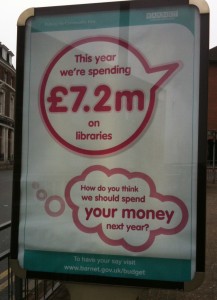Archive for February, 2010
Valituskuoro – the ‘complaints choir’
One of the best comments I’ve found under one of my blog posts a while ago (it was about whinging in comments boxes) said…
 “Philosophers have sought to understand the world. The point is to complain about it.”
“Philosophers have sought to understand the world. The point is to complain about it.”
Here, Peter Levine has a nice post up about the ‘complaints choir‘ in Chicago.
'Empowerment'
For me, this post by Kevin Harris sums up what happened over the past decade, where new Labour’s lightly held good intentions met their managerialst bent and the two cancelled each other out:
“Round about 2003, the field of social inclusion and new technology became counter-productively transformed when government started putting up huge chunks of funding without much thought about what was needed in local situations, thus attracting many who were willing to spend it for them without the burden of values or the inconvenience of insights into the nature of exclusion.”
JFDI: tactics, transparency and interactivity
Dave Briggs has a good post up about how organisations introduce technology. He contrasts the ‘JFDI’ approach (which stands for Just Do It) and a more boring sustainable approach.
I’ve met Dave and he has very sensible views on Football. Our mutual friend Brian Clough could have contributed to this whole discussion. As he put it (here) …
“…tactics aren’t for me, they’re things that teams dream up because they might lose”
Translating that into Dave’s question, it’s basically about getting organisations to increase their desire and competence in the field of ‘interactivity.’ The rest – the tactical choices of which technology, the timelines and roll-out plan – become somewhat redundant when you are able to deploy a team that know what their jobs are and are happy, competent and confident that they can do them. This question applies to local authorities a good deal. Read the rest of this entry »
Centralisation: A turning point?
For those of us who would like local politics to be more highly valued, two slightly conflicting observations were made by prominent political bloggers last weekend.

It is possible that the Tories are regretting using pics of David Cameron to front their 2010 launch?
The first was by the ever-perceptive Potlatch writing about James Purnell, and digging into the question of ‘professionalisation’ of politics:
“Purnell – like Ruth Kelly and Ed Balls – ticks both journalism and policy advice. This is a slightly different issue from the long-standing, Weberian concern with professionalisation of politics. A professional politician is one who is expert at campaigning and winning elections, but has no experience or life outside of this. New Labour was more about the scientisation of politics (sorry if that’s not a word), in which expertise in economics and public affairs became a precondition of political authority.” (emphasis mine)
Buzzing the broadsheets
This blog, titled as it is as Local Democracy but spending a fair portion of it’s commentary on social media technology, rests on the premise that local democracy will be profoundly affected by tech-driven changes in the way that the media works, and the way that people can associate with each other.
It will change the very character of representation and the way we make big decisions.
You either buy that premise or you don’t. If you do, I’d be interested to know what you think that the media is going to look like in a few years time.
Writing elsewhere, I’ve made a contention that I’ve not been contradicted on (yet). Please do contradict me if you want – I think that it’s a fairly important suggestion to absorb if you can’t. It’s actually two contentions – one following the other. Here goes: Read the rest of this entry »
Elsewhere
 I’ve just had this article published by The Telegraph. Sometimes, it’s only when you read yourself elsewhere that you see that you buried your more important point under less significant ones.
I’ve just had this article published by The Telegraph. Sometimes, it’s only when you read yourself elsewhere that you see that you buried your more important point under less significant ones.
“Since the 2005 election, we have raced past the tipping point. Facebook has 23 million British users. About half of the eligible voters are social networkers, sharing and seeking recommendations among peers rather than trusting broadcast messages. The real contest is not the three-way blogs/newspapers/politicians fight, but how effectively each can cast its bait into the social networking sites, and who will have the greatest effect.”
So the creation of good viral objects may make a big difference? Apropos of that, yesterday, the people behind MyDavidCameron added a new string to their bows: MyToryTombstone.
Whatever else it does in terms of damaging the Tories (I’m sure the Tories have plans of their own on this front), this comment really sums up how difficult it will be for parties to get their narrative out this year.

Three signposts off
I’ve started drafting three articles in the last 24 hours for this blog only to find a better one on the same subject written by someone else.

Crowdsourced data visualisations are more useful for the public sector
Firstly, it’s a regular theme here that data visualisations are a huge opportunity for us all because they allow us to break the monopoly that civil servants, sloppy journalists and political parties have in describing the problems that elected representatives are expected to solve.
The rubbish-in-rubbish-out problem. They are, therefore an opportunity to involve more of us in a constructive way in policy making.
According to Public Technology, this is a bigger opportunity than I realised because public sector managers use data visualisations more than the private sector do.
Secondly, Alison Benjamin has a good roundup of the problems that a reliance upon social entrepreneurs and active citizens can bring in the provision of local services.
“…if you live in a neighbourhood where concerned, educated, articulate residents with time on their hands will rise to the challenge. Leaving the fate of, say, the local library in their hands may not be such a bad idea. But what about areas where decades of joblessness and drugs and benefit dependency may have robbed residents of any glimmer of a can-do culture? Here, doesn’t the state have a moral duty to provide a library service where pensioners can read the paper, where schoolchildren can do their homework in peace and discover a world of books not available at home, and where the digitally excluded are able to participate in the wonders of the internet?
If library provision were left to local volunteers, or social enterprises – those not-for-profit organisations run by entrepreneurs much-feted by the cheerleaders of this new settlement – what of the postcode lottery that would no doubt result?”
She’s very restrained. If I’d have been there and got the glib ‘so what’ response that she received, I would have left the room only to return shortly with a flamethrower.
Thirdly, there’s Dave Briggs post on Google Buzz – the reviews I’ve seen are mixed. One side of the argument from Google Reader addicts who carefully select who sends them recommendations is that all of a sudden a tool that was working beautifully is suddenly chucking loads of unrequested information at me.
The other side of the argument is that it will being an awful lot more people into the day-to-day activity of sharing and collaborative authoring of content. This can only be a good thing for everyone, surely?
Local budget consultations
I was out-and-about the other day and came across this advert:
 My local authority want me to have my say in how they spend and collect their money. When I got home, I visited the www.barnet.gov.uk/budget site accordingly.
My local authority want me to have my say in how they spend and collect their money. When I got home, I visited the www.barnet.gov.uk/budget site accordingly.
It was quite good. It went some way towards explaining how the council is funded and what it spends its money on. There are some big headline graphs that show “Barnet Council’s back office costs are amongst the lowest in London” and “Barnet receives substantially less financial support from central Government than the London average.”
It also has a budget simulator using Delib‘s platform. For some reason, it only offers us the option to see the impact of budget reductions in specific policy areas (I’d like to see options to increase some of the spends). For the sake of completeness, there’s a detailed document that shows the figures tabulated, and if anyone had the time and energy, they could go through the figures and raise questions about particular elements.
But Barnet deserve credit for having also taken the figures and poured them into a good info-graphic (by the way, I’m including these images just in case they are taken down when the consultation ends). Read the rest of this entry »
Gentle mockery
It’s Friday. And it’s nearly hometime. Let’s just pop over to the Glum Councillors tumblr site to see if there’s anything to look at?
Well, there’s Cllr Doherty (pictured):
“If this corner doesn’t qualify as a dangerous bend, I don’t know what does,” said Cllr Doherty standing at the corner … in the road … with his back to the oncoming traffic.
You’ve probably seen the MyDavidCameron site? Whatever you think to the politics of taking the tiddle out of the Tory leader, I like the quality of the site. They’ve not allowed themselves to be overwhelmed with tedious pointscoring and there are quite a few gentle (or even absurd) little digs.
I’m not quite sure why, but I firmly believe that if politicians were gently teased a lot more, the country would be all the better for it.
Read the rest of this entry »
Using a weblog crowdsource intelligence
I’ve been working with Mick Fealty over at the Northern Ireland political weblog Slugger O’Toole on a bit of an experiment. We decided to try and convene some free consultancy for all of the political parties in Northern Ireland – starting with the ruling (!) bloc, the DUP.
As with all political weblogs that host antagonistic debates, there is no shortage of name-calling and point-scoring. But if you ask the readers to look at things from a strategic point of view, you may find out something that you didn’t know in the first place.
Mick is no mean political analyst himself, and nor are his regular contributors. But by inviting commenters to look at thing objectively – to spell out what they see as the strengths, weaknesses, opportunities and threats that the DUP face, commenters from all sides of the spectrum could at least agree on where the DUP stand on the political chessboard.
It provides a useful tool in any materialist analysis of ‘what will happen next’ because, for all that some politics is, as Harold Wilson put it, “a crusade or it is nothing”, the last few weeks in Northern Ireland have shown that political parties rarely do anything unless it allows them to make the best of whatever strategic hole they are in.
So, having attracted lots of comments over the course of one day, deleted the ones that sought to introduce pointless whataboutery and pointscoring, Mick was left with a couple of dozen nuggets of information.
Next step? Let’s visualise them – put them in a fun-to-fiddle-with application like Prezi: (be patient – it takes a while to load…..)
Shortly, it will be published on Sluger and the readers will be asked whether we’ve got the sizes of those particular strengths / weaknesses / opportunities / threats right. The presentation will be tweaked accordingly and outcome will be useful in future – if for nothing else apart from settling arguments.
The other parties will be getting their SWOT done for them over the next few weeks.
(Thanks for Tim Davies for introducing me to Prezi – it’s a bit clunky but worthwhile in the end).


